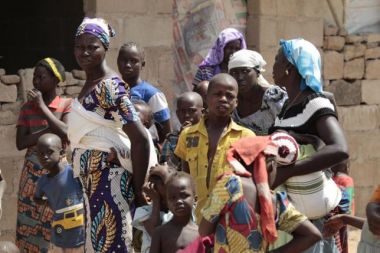Boko Haram pursues reign of terror as deaths spiral amid bombings, shootings

Suspected Boko Haram militants pursued their campaign of terror in Nigeria on Tuesday, detonating a bomb at a local government building on the outskirts of Zaria in northern Nigeria, killing at least 25 people.
Following the blast, three gunmen emerged and started firing on civil servants, state governor, Nasir el-Rufai, said on his Twitter feed.
The bomb exploded at around 10 a.m. (0900 GMT) in Zaria's suburb of Gogarawa, where people were there to welcome a newly appointed head administrator, according to Zinari Shehu, a local radio journalist who was at the scene, according to Reuters.
Last week alone, the militants killed more than 200 people died following a series of attacks. Among the dead were at least 44 people who were mowed by the militants in Jos.
Boko Haram has stepped up attacks over the last 10 days.
The extremist group is following the footsteps of the Islamic State in the Middle East by also seeking to carve a state of their own in Africa governed by strict sharia law. The group's insurgency began in 2009 and now it controls a territory larger than Belgium.
Nigerian-led regional forces have joined together to drive out the Boko Haram, but the militants continue to hold ground in the Sambisa forest reserve while many of its fighters have spread throughout the country.
As they continue to lose more territory to advancing African multinational troops, the Boko Haram militants have resorted to guerrilla tactics of hitting soft targets such as markets and churches.
On Sunday, at least five people died after a female suicide bomber blew herself up inside a church packed with worshippers in Nigeria, according to reports.
The attack in a crowded evangelical Christian church in northeast Nigeria was the latest in a series of attacks linked to the Islamic extremist group Boko Haram, which earlier swore allegiance to the jihadist organisation Islamic State in the Middle East.
Police immediately responded to the attack at the Redeemed Christian Church of God in Potiskum, the largest city in northeastern Yobe state. The blast, according to a congregant who was too scared to give identification, came from a woman in the congregation itself.
Five bodies from the blast were counted by reporters in the local hospital, where one injured woman was also being treated.
Nigeria's President Muhammadu Buhari denounced the attack on a Christian church's parishioners, declaring them as barbaric.
Buhari, who vowed to personally head the fight against Boko Haram, also said the attacks all the more emphasise the need for an expanded multinational army to defeat the group.
A big swath of northeast Nigeria last year fell into the hands of Boko Haram, which declared an Islamic caliphate.
As the group tried to spread terror by boosting cross-border attacks, Nigeria and its neighbours formed a multinational army that drove out Boko Haram this year.
However, attacks by the Boko Haram are growing in number following a command by the Islamic State to escalate violence during the month of Ramadan.
Boko Haram has been blamed for the deaths of some 200 people just this previous week.
On Friday, six female suicide bombers exploded, killing scores, including a soldier at Zabamari Muna village outside Maiduguri, northeast Nigeria and where Boko Haram traces its roots.
On Wednesday, almost 100 men and boys who were praying in mosques were shot. A local official said on Sunday that 21 more bodies have been found from burnt-out houses.
The six-year-old Islamic uprising has killed at least 13,000 and forced 1.5 million people to be displaced from their homes.











